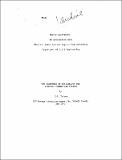The economics of reliability for electric generation systems
Author(s)
Telson, Michael Lawrence
DownloadMIT-EL-73-016-05877782.pdf (11.15Mb)
Metadata
Show full item recordAbstract
Providing excess generation capability for reliability
purposes costs a utility money. It is also true, that providing higher reliability adds value to electric service. After
some point, however, the additional benefits do not warrant
the additional cost. This work deals with the questions of
how reliable should generation capability be for meeting system loads, what models should be used to measure this reliability and what bases should be used for answering the above two
questions.
We critique the measures that have been used and
suggest that an energy shortage related measure in probably
the best one to use. In addition, we specify what load and
what benefit measurement models should be used. The resulting
procedures are then used to develop techniques for 1) creating
long term expansions of electric utility systems at various
reliability levels and for 2) analyzing the costs and benefits
of plant additions to arbitrary system expansions.
From representative data, we conclude that present
generation reliability levels for operation are probably too
high. We discuss the magnitude of possible savings and we
find that although only a few % of total system costs, they may
have substantial profit impact.
Description
Based on a Ph. D. thesis in the Dept. of Civil Engineering
Date issued
1973Publisher
MIT Energy Lab
Other identifiers
05877782
Series/Report no.
MIT-EL73-016
Keywords
Electric power-plants in United States -- Costs, Electric power systems -- Reliability
Collections
The following license files are associated with this item: